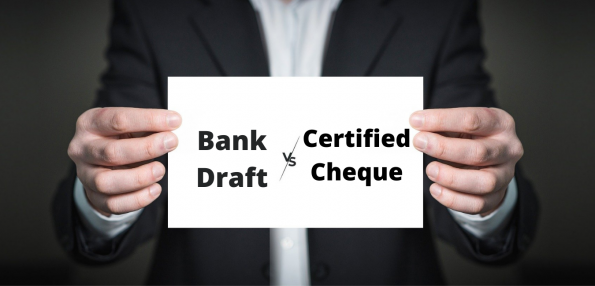Banks in Canada provide both certified cheques and bank drafts. Although they have a similar mode of deposition, they are issued differently. It is vital to be familiar with both banking terms because they might be needed for some transactions.
Both bank drafts and certified checks are utilized for high transfers, and their operations are quite similar. This article will be reviewing bank draft vs. certified cheque; their similarities, differences, pros, and cons.
What is a Bank Draft?
A bank draft is a payment tool that serves as security for the payee. That is, the payer’s financial institution issues a bank draft to the payee at the payer’s request.
Once you send the order, your financial institution freezes an amount from your account. This is to enable the payee to make the eligible withdraw from your account.
With bank drafts, financial institutions make transfers directly to the bank account provided by the payer. A bank draft does not require the signature of the payee.
How Bank Draft Works
There are representatives from your financial institution that act as an intermediary in this transaction. The bank draft is only issued on your request and will be proceeded once sufficient funds to cover the draft are verified in your account.
Once fund verification is done, your financial institution deducts the amount on the bank draft from your bank account. Bear in mind that some banks may charge flat fees for the drafts. The process is complete once the payee deposits or cashes the draft.
Note that some banks may refuse to stop payment on a draft after being issued. That’s because, according to their records, the transaction has already occurred.
If the buyer wants to cancel the transaction, the bank will typically have them redeem the draft in full. A lost, stolen, or damaged draft can be withdrawn or replaced in rare situations if the client provides the proper identification.
Pros of Bank Draft
- It is convenient- you don’t have to withdraw a large amount since the bank directly transfers it.
- It is a safer means to transact
- No maximum amount limit
- Low transaction fee
- No signature required
Cons of Bank Draft
- If the money is lost or stolen, or delivered to the wrong person, the bank won’t replace the lost sum.
- It cannot be canceled once paid.
What is a Certified Cheque?
A certified cheque (sometimes referred to as a bank certified cheque) is a personal cheque stamped with the bank’s permission. The bank is simply verifying that you have sufficient funds to cover the amount on the cheque.
Certified cheques are usually used by businesses and individuals to settle transactions. The issued amount cannot be used for other transactions.
Only customers who have an account in the banks and request the bank to make a payment to a specified person or bearer can be issued a certified cheque.
How a Certified Cheque Works
When a customer requests a certified cheque, the bank representative verifies that the customer has sufficient funds in their account to cover the required amount.
An intermediary (bank staff) is also involved when issuing a certified cheque. After fund verification, the amount will be deducted from your account. The check’s validity is usually limited to 60 or 90 days. Note that payment cannot be stopped after the certified cheque is issued.
Pros of a Certified Cheque
- It is an excellent tool for large purchases or transactions.
- Certified cheques give further protection to significant purchases if a buyer’s credit score or payment is questioned.
Cons a Certified Cheque
- You can’t stop the transfer if the wrong person or any scammer receives your cheque.
- High transaction fee
Bank Draft vs. Certified Cheque – Similarities
- The payer must have a sufficient amount to cover the payment
- Both are a secure method of payment
- The payer must have an account in the issuing bank
- Both are used for professional relationships
- Both are used to transact huge amount money money
- It cannot be reversed once issued except in exceptional cases
Bank Draft vs. Certified Cheque – Differences
- A signature is required when processing a certified cheque, but not for a bank draft.
- With a certified cheque, funds are not reserved to carry out the transaction while with bank drafts, funds are reserved.
- A certified cheque is written by the payer and verified by the bank, while a bank processes every aspect of a bank draft on behalf of the payer.
Conclusion
Both bank drafts and certified cheques are similar in terms of functionality and operations. The primary purpose of these two instruments is to provide further assurance and confidence to the person who will receive the money.
With both tools, it is sure that the payment will be honored once the availability of funds is confirmed. When receiving or paying a cheque or draft, ensure that the funds are deposited into the correct account. Be sure to save all necessary paperwork as they will come in handy in the event of fraud.












